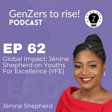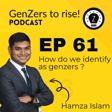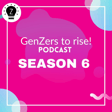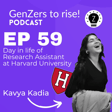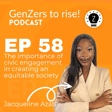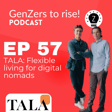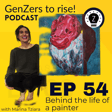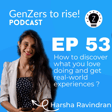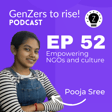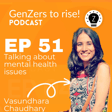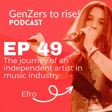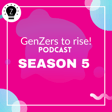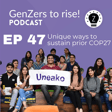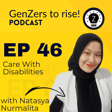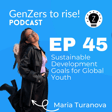Introduction to Changemaker-Z and Entrepreneurship for Gen Z
00:00:01
Speaker
Hello everyone, I'm Kennedy. And I'm Vassilis. We run Changemaker-Z, a student-run initiative that aims to empower, educate, and connect Gen Zers interested in entrepreneurship. We interview teenagers with impactful projects and create resources to help you change the world. If they can't do it, so can you.
00:00:23
Speaker
On this podcast, we discuss the logistics of creating different types of projects with Jin Ziers who have already done it. We will leave our social media and website information in the description.
Understanding Credit Scores and Benefits of Extra Credit by credit.com
00:00:43
Speaker
Guys, I want to share something really interesting. Have you ever heard the term credit score? A credit score is a number based on the statistical analysis of a person's credit files. That in theory represents the credit worthiness of that person. There are different methods of calculating credit scores. The most widely used type of credit score is the FICO scores. Did you know that there are 28 different FICO scores? Imagine that.
00:01:05
Speaker
If you are wanting to buy a car, you might check your credit score on a free app. You walk into a dealership thinking, you know, you got a pretty good score, feeling confident, so the dealership pulls your credit and it's drastically different than your free score. The solution? Extra credit by credit.com, the sponsor of this episode. With extra credit, you can access the 28 different FICO scores so you can see what the lenders see.
00:01:30
Speaker
What if you want to build a credit history in order to recall later? Well, Extra Credit can help you with that by reporting your rent and utilities to the credit bureaus. In addition to that, Extra Credit offers features to guard your identity, $1 million ID insurance, dark web scan and data breach alerts, as well as cash rewards for personalized offers.
00:01:51
Speaker
To sign up for extra credit, go to credit.com slash Gen Zers and get started there. To sweeten the deal, you can even get the first seven days absolutely free. It is just $24.99 plus tax a month after the free trial and you can cancel any time. So go check out extra credit today and start working on your credit goals.
Meet Anand Mehta: Innovating Assistive Technologies for Kids
00:02:26
Speaker
Hello everyone, welcome to another episode of the Gens There's 2 Eyes podcast. I'm Vasilis and with me is Kennedy. Hi! With us in the studio is Anand Mehta, the founder of a non-profit organization called The Magical Modules, which creates assistive technologies for children with developmental disabilities at a celebrated policy. This episode is all about independent mobility in kids with developmental disorders. Welcome to the show, so nice to meet you.
00:02:54
Speaker
Hi, thank you so much for having me. We are so excited to have you here. So, in order to start the conversation, we would like to learn what inspired you to create magical motors. Yeah, so this is a two-part effort between me and my cousin, Ropa.
00:03:09
Speaker
who lives in Omaha, Nebraska. So I'll tell you my end of my story. So in 2019, I began volunteering at a music therapy facility in Arizona because I wanted to combine my interests in music and volunteering.
00:03:24
Speaker
And I really enjoyed volunteering over there and I still go there to this day. And what I really learned from that is that I love to help out kids with developmental disorders. So I thought to create a change in that community and start an initiative of my own. With the help of my cousin, who is also pursuing this project before me for his Boy Scout Eagles dot com. So we thought to come together to make this initiative possible.
How Simplicity Drives the Rewiring of Toy Cars for Mobility
00:03:52
Speaker
That's amazing. I was actually going to ask you kind of about your background music because I noticed you played cello. And also I played violin. Oh, that's so cool. Yeah, I played violin in high school. You were like in a national symphony or something. Oh, yeah. So I played for this unique to symphony.
00:04:10
Speaker
Yes, I personally played in my high school in the very back row, but kind of kind of the same. But how did you come up with the idea to rewire cars so that they are controlled by a push button? So I actually found this approach. So my cousin told me about it.
00:04:32
Speaker
because he was pursuing it on his own for his Eagle Scout project. And he worked together with assistology, which is a local Omaha based nonprofit, and the University of Nebraska Medical Center, their Monroe Meyer Institute, which has helped us a lot. He started working with them
00:04:52
Speaker
and the actual overall initiative is called Go Baby Go and we just wanted to take it a step further and level it up by also introducing our curriculum in high schools and STEM organizations across the country.
00:05:07
Speaker
Right, so each high school can start their own chapters as well. That's something we can talk about later too. I'm imagining that there are different skills that you need to start designing this process. And my question is, how did you learn the skills needed to do that?
00:05:28
Speaker
Yeah, so I actually learned this process in June of 2021. So I took the help of Megan Walls of assistology, who had previously helped Rohan with his Eagle Scout event. I was actually in Omaha for a medical research camp. And I came across Megan as a way to kind of explore what my husband was doing. And I really fell in love with it.
00:05:56
Speaker
For me, personally, I almost had no engineering experience from before. My extent was probably building a Lego set with a manual. So there really isn't that much expertise needed, which is why we want to implement it in high schools across the country, because we know that it will be feasible for them to learn it and also further their leadership and long-term skills.
00:06:21
Speaker
That's good to know because when you talk about rewiring cars and all this stuff, it kind of sounds like it'd be really difficult, but it's nice to know that it's a pretty simple process that can be implemented.
00:06:37
Speaker
I know that your process, like pediatric, you kind of on your website, it kind of some facts talking about how pediatric power wheelchairs cost upwards of $25,000 and take years to make, which is pretty unaffordable. What's the difference? How much would, say, one of your cars make? One of your kitty cars?
Affordability of Toy Cars vs. Pediatric Wheelchairs
00:07:01
Speaker
So our cars, they usually cost around $350, which, when compared to $25,000, seems like very little. And it takes roughly three or four hours to make. And so that's why we try to target the high school population again, because it's a fairly affordable project, too, that can make a difference in the community, like a tangible difference in the community.
00:07:27
Speaker
And that's one of our missions is to allow each child to gain the access to mobility and independent mobility.
00:07:36
Speaker
Yeah, okay. So, and guys, we don't mean like cars. We mean like, these are obviously for children. So it's like those toy cars, like Barbie cars, cars like that. So they're not like very high tech vehicles, but I remember Haveyos when I was young. I felt like I was, I could ride down to the grocery store and those, but how can we help create a more equitable world for people who have disabilities?
00:08:01
Speaker
Uh-huh, yeah. So I think in my opinion, I think we can create a more equitable world by creating technologies that will allow them to have the things that we take for granted often. What always inspires me is to think about two questions. What if I didn't have the ability to move on my own? And how would my life be affected?
00:08:30
Speaker
And those two questions often guide me throughout my entire journey whenever I'm feeling stuck, or maybe I have less of a drive to do something at the time. And that really drives me to make an impact in the community. So I think by creating assistive technologies, which is what we're doing right now, we're making a more equitable and inclusive community where every child has the right to mobility.
00:09:00
Speaker
I like that. And I love that you're focusing on children, even like under the age of two or like children in general, because a lot of the time the focus isn't on like giving like children independence. I feel like. Right.
00:09:15
Speaker
Would you like to tell us more about the curriculum you are designing and what are your plans when it comes to the secret lineage? Yeah, of course.
Building an Assistive Curriculum: Steps and Resources
00:09:26
Speaker
So we've been curating our curriculum around October and November of last year.
00:09:31
Speaker
And we started out by building a manual. One of the reasons we started Magical Motors actually is to create an organized system through which anyone can access all the materials needed to build a car successfully and even host their own build event.
00:09:50
Speaker
So what we've started to include is manuals containing like images and videos, cost and supply sheets which list out successful vehicle builds and how much materials costed and yeah just like the overall how much everything was.
00:10:11
Speaker
We also include support at any time. So in case anyone needs help with building the car, we'll be able to reach out to them and almost anything if they need any help. Other than that, I think we're adding more and more as we go on.
00:10:34
Speaker
And we've also started the process of implementing it in a lot of organizations nationwide. So we started that around the beginning of this year. And so far we've gotten to STEM organizations such as the Arizona SciTech Institute, therapy clinics such as Excel and Southwest Human Development.
00:11:00
Speaker
We've also gotten to a few medical centers. So as I said before, we've worked with the University of Nebraska Medical Center and we're currently finding collaborations with other medical centers too. And we've reached out to four high schools across the country in California, Wisconsin, Nebraska, and Arizona. And we look forward to adding more chapters.
00:11:24
Speaker
That's okay. So now that we're on the chapter thing, if say we wanted to start a chapter, do we reach out to you or how does that process work? Go to your website. Yeah. So on the website, there's like an application form. It's very short. It should probably take around 15 or 20 minutes. And yeah, based on that it's
00:11:46
Speaker
It's like a small application, like it won't take too much time. And based on that, we'll see if you're a good fit for us to create a chapter, which most likely you will be since you're taking the initiative to do so. And from there on, we'll give you all the materials that are necessary to start building your own successful chapter.
00:12:09
Speaker
Alright guys, well you heard it. If you're interested in starting your own chapter, go to magicalmotors.org and we'll also have that in the description. It's just amazing how many collaborations you have already accomplished with the magical motors.
00:12:25
Speaker
And my question is that like you have transformed magical motors to a non-profit and this
Registering Magical Motors as a Non-Profit: Process and Impact
00:12:36
Speaker
non-profit has been registered as a 501c3. So what is the process of becoming one of non-profit organization and what are the advantages of selecting this type of non-profit?
00:12:53
Speaker
Yeah. So we actually, one of our goals was to actually create a registered organization. And with that comes a slightly lengthy process. And we had to work with the IRS, like filling out documents, which took a few weeks, honestly. But the process is kind of lengthy, but it's very rewarding because it allows you to establish a sense of credibility in your community.
00:13:22
Speaker
that you're responsible and organized enough to handle such a duty. And honestly, in my opinion, it's an honor to be a 501c3 organization because I know that not very many teenagers have the ability to do so. And so for that, I feel very thankful that I was given this opportunity to create an organization like this.
00:13:46
Speaker
Yeah, it's amazing what you guys are doing and how you're helping out your community. What advice do you have for other students who want to start their own initiatives like this?
Tips for Students: Pursuing Interests and Starting Initiatives
00:13:59
Speaker
Yeah, so I have a few pieces of advice. So first of all, feel free to explore your interests at any time.
00:14:08
Speaker
Yeah, so I still continue playing music to this day, and so that's one of my key interests, and I'm still doing that. So if you have a passion, make sure you go for it at any time of your life. It doesn't even matter. And if you want to start a nonprofit organization,
00:14:29
Speaker
One piece of advice that I have is to probably start out small and make sure you establish connections as soon as possible and make sure you keep doing that as you go on because you never know when those connections will become super super valuable at any time and make sure you stay organized too. I've learned that with maintaining a non-profit there are like five million things to handle
00:14:58
Speaker
And so if you stay organized, you'll have an established system where you can find anything at any time. And then for starting out small, make sure you don't have too many big aspirations at the very beginning. It's okay to dream big, but you need to have a systematic plan of how to get there.
00:15:22
Speaker
And so for our, for instance, with Magical Motors, we started out by spreading our organization in Facebook groups and local Facebook groups, like the Cerebral Palsy Group of Arizona. And through that, we got to know our first few clients or recipients
00:15:43
Speaker
And from there on out, we just started making connections with other therapy clinics, which gave us connections to STEM organizations, which just keeps on building and building. It's like a boulder.
00:15:58
Speaker
Thanks so much for your advices. We have to keep that by having a plan and following your dreams, you can really achieve whatever you want. And when you have real people and the perfect tools to work with, you can really achieve your goals. This is one of my favorite questions, which is a little bit more personal.
Balancing Passions: Music, Medicine, and Leading a Non-Profit
00:16:18
Speaker
What are the passions and hobbies do you have outside magical motors? How do you find a way to balance everything on your plate? Yeah.
00:16:27
Speaker
Like I said before, I'm really passionate about music. I've been playing the cello for about seven years, and I've explored that through playing in my school orchestra as well as the Phoenix Youth Symphony.
00:16:38
Speaker
And I also sing Indian classical music so I've been doing that for the past twelve and a half years and I'm actually just about to get the equivalent of a bachelor's degree in Indian classical music later this November and so I guess
00:16:58
Speaker
I honestly can't live without listening to music while I do anything. So that's how I integrate my passion for music. And other than that, I aspire to be a physician in the future. So medical research is one of my key hobbies.
00:17:16
Speaker
And I've explored that through performing research at Arizona State University and the University of Arizona College of Medicine. And I'm really thankful that I've been given these opportunities. And honestly, one of my big things is to integrate all three of these things, which is why I started Magical Motors as a way to integrate volunteering and kind of like the biomedical or biotechnology field.
00:17:42
Speaker
So I'm actually doing at the University of Arizona College of Medicine, I'm integrating my interests between music and research. And yeah, I feel that it's really fun to be able to explore like these niche sections of both of my hobbies together.
00:18:03
Speaker
That's amazing that you were able to combine your hobbies and passions into one thing, which is, I feel like it could be really hard. So, what does Magical Motors' future look
Future Aspirations for Magical Motors: College and Beyond
00:18:20
Speaker
like? Are you planning to continue it in college, or do you have any plans for it right now? Oh, you're only 16, so.
00:18:29
Speaker
Yeah, so right now I'm still in high school. I'm going to be a junior this year. So the sky's the limit for magical motors right now. We're still exploring a lot of our interests and how we can collaborate with other organizations to spread our mission and
00:18:46
Speaker
I honestly plan to continue it in college and I don't even know when I'll stop. So I'm super, super passionate about stuff like this. So I honestly think it'll keep on going for the rest of my life, honestly. Yeah.
00:19:06
Speaker
Well, that's amazing. I know you guys have great things stored for you in the, in store for you in the future. And I'm so excited to see where magical motors grows. And I hope, like, I hope more people start initiatives in their own high school because this is something that's actually making a difference. And even like, maybe at some point you can even implement, I don't see why you couldn't implement this in college. There's a bunch of different types of stuff as well in college too. So maybe we could expand to that.
00:19:35
Speaker
Sorry, I forgot to talk about that a bit. So I've actually recently found a group at Arizona State University that's willing to adapt cards. And regarding our future plans, actually, we're going to host our first independent build event on August 20th here in Phoenix, Arizona. If any of the viewers within Phoenix are interested in attending our build event, feel free to volunteer.
00:20:03
Speaker
Yeah, that'd be amazing. So you can see, you can be there and see what it's like. All right, guys, we're all flowing with feelings. Thank you for joining us for another episode of Gen Zers to Rise podcast. If you want to keep up with On It and Magical Motors, we will have all this information in the description. Don't forget to follow us at Gen Zers to Rise on Instagram. So next time, don't forget to change the world. Bye.
00:20:39
Speaker
Thank you guys for listening. We hope you enjoyed the conversation. We had such a great time. Make sure to leave us a review. If you want more Changemakers content, you can follow us on Instagram at JinsearsToRise and on Facebook at ChangemakersEAT.

